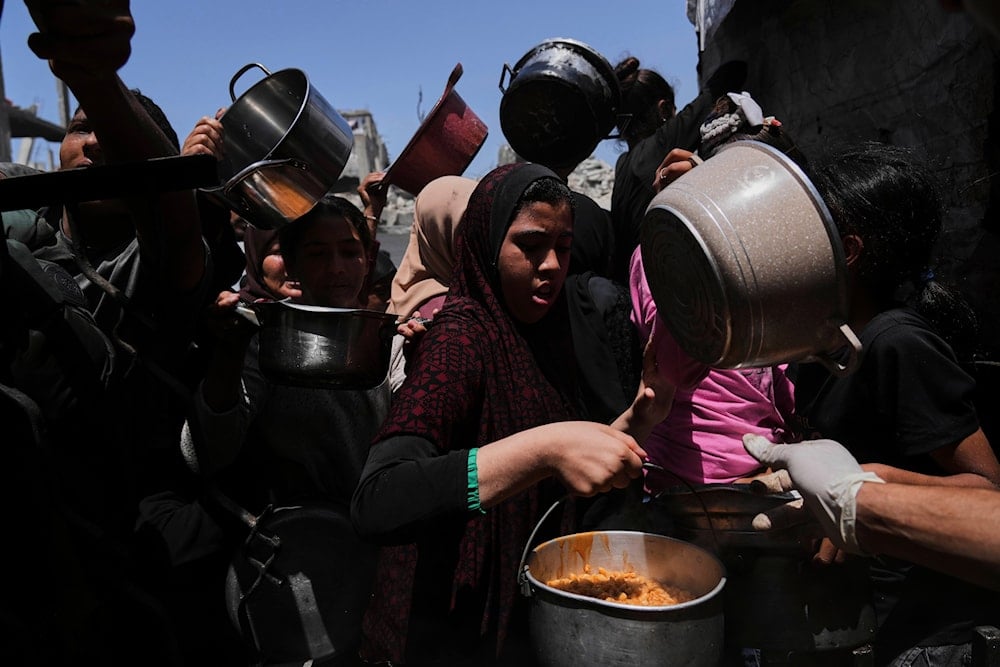Gaza's dire crisis: No food, critical medicine shortage
The Kuwait Hospital in Rafah and the World Food Programme warn of collapsing medical services and food shortages in Gaza due to closed crossings and a severe shortage of over 75% of essential medicines.
-

Palestinians receive donated food at a community kitchen in Beit Lahia, northern Gaza Strip, Saturday, May 3, 2025 (AP)
Hospitals and Humanitarian Organizations have warned that Gaza is facing a catastrophic crisis, with food and medicine shortages reaching critical levels amid "Israel's" siege on the Strip.
The Kuwait Specialized Hospital in Rafah reported on Saturday a dire scarcity of the majority of vital drugs and basic nutritional supplies needed for patients, highlighting that over 75% of essential medical supplies are critically lacking in the Gaza Strip.
The Kuwaiti hospital warned that "the ability to continue providing medical services is now at risk," adding that "the stock of medicines and medical supplies will not last for more than a week," stressing that "most healthcare services will come to a halt without urgent and immediate intervention."
The World Food Programme (WFP) warned that its food reserves within the Gaza Strip have been completely depleted, urgently calling for humanitarian aid to be allowed into the besieged enclave. The WFP confirmed that critical life-saving supplies are prepared for delivery yet remain inaccessible due to the continued closure of all border crossings.
The Gaza government media office reported on Saturday that fatalities resulting from the Israeli blockade's starvation policies have increased to 57, with officials warning this number may rise further.
The media office added that Israeli authorities have maintained their closure of all border crossings for 63 straight days, preventing the delivery of critical humanitarian aid, including infant formula and vital nutritional supplements.
'Israel' enforces siege on Gaza
On March 2, 2025, "Israel" initiated a comprehensive blockade on the Gaza Strip, halting all humanitarian aid deliveries through key crossings, including Rafah, Beit Hanoun, and Karem Abu Salem.
This action followed the expiration of the first phase of a ceasefire agreement and was intended to force Hamas into accepting a new ceasefire proposal, reneging on the original deal reached. The blockade has led to severe shortages of food, fuel, and medical supplies, exacerbating the humanitarian crisis in Gaza.
As of April 25, 2025, the United Nations World Food Program reported that its food supplies in Gaza had been depleted due to the ongoing blockade. Approximately 80% of Gaza's over 2 million residents rely on humanitarian aid, and markets face extreme shortages with soaring prices, rendering essentials unaffordable.
The blockade has been condemned by rights groups as a potential war crime. Malnutrition is escalating rapidly, with the UN reporting that 3,700 children are suffering acute malnutrition in March, an 80% increase from the previous month
Two months after the initiation of the blockade, Amnesty International has demanded that Israel immediately end its brutal blockade of Gaza, now in its third month, condemning the siege as a genocidal war crime that weaponizes starvation and illegally punishes civilians collectively.
The UN's OCHA spokesperson, Olga Cherevko, warned that Gaza faces catastrophic conditions, with water access now "impossible" and food supplies depleted, describing violent clashes over scarce resources.
She painted a dire picture: children traumatized, elders scavenging for survival, collapsing hospitals, and critical fuel shortages—all while Israeli authorities continue blocking aid through closed crossings.

 3 Min Read
3 Min Read










